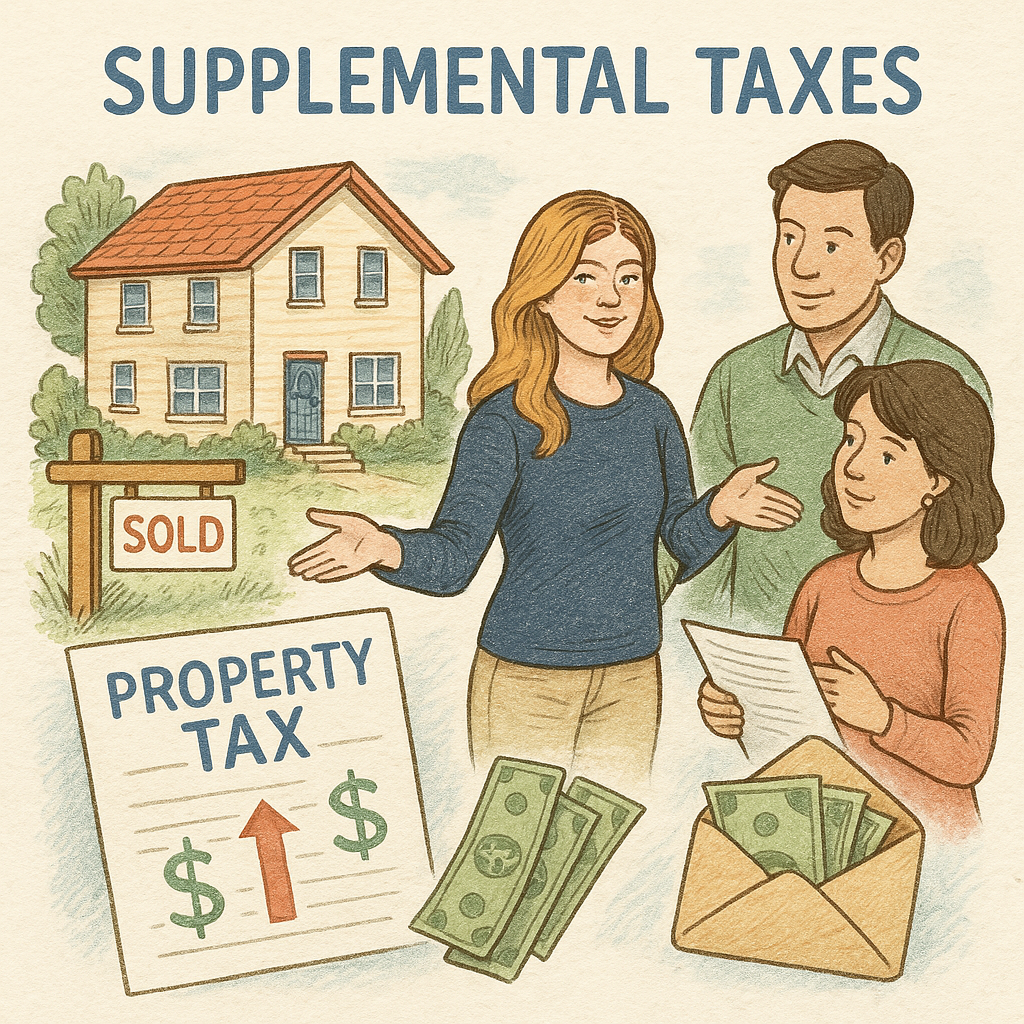HOME BUYING GUIDE: SUPPLEMENTAL TAXES
Supplemental taxes are an element that prospective homeowners should understand thoroughly.
These taxes arise due to certain changes, including a transfer of property ownership or new construction.

Supplemental taxes in California are additional taxes triggered by property ownership changes or new construction. They adjust the property tax to reflect its current market value during the fiscal year. Understanding these taxes is crucial for new homeowners to avoid unexpected financial obligations.
- 🏠 Supplemental taxes arise due to property reassessment after a sale or construction.
- 📅 These taxes are based on the difference between the property's old and new market values.
- 💸 The Sacramento area tax rate used in calculations is approximately 1% to 1.20%.
- 💼 Supplemental taxes are separate from your mortgage payment and handled directly by the homeowner.
- 🗓️ Fiscal year timing affects whether one or two supplemental bills are sent out.
- 🔍 Bills are normally managed by your escrow officer during the closing process.
- ☑️ Including these taxes in your financial planning helps to avoid surprises.
Supplemental taxes are additional property taxes that apply due to property reassessment following an ownership change or new construction. Introduced in California in July 1983, these taxes serve to reflect changes in the property's value more accurately within the fiscal year. While standard property taxes are annual, supplemental taxes are event-triggered. When purchasing a home or undertaking significant improvements, you may receive one or two additional bills based on the reassessment of your property's value.
For more details on supplemental taxes, you can visit the Placer County Tax Collector's website.
Calculating supplemental taxes involves several steps that determine how much additional tax you'll owe. When ownership changes, the Assessor's Office values the property at its current market rate, known as its "base year value." They then assess the difference between this new value and the property's existing recorded value. The resulting difference is the "Supplemental Assessment," which serves to calculate the new taxes owed.
The Assessor sends out a "NOTICE OF SUPPLEMENTAL ASSESSMENT AND IMPENDING TAX BILL," indicating the impending taxes. Based on this reassessment, the Auditor-Controller calculates the taxes due by applying Sacramento's prevailing tax rate, around 1% to 1.20%, and distributing this across the months remaining in the fiscal year. If the new assessment lowers the assessed property value, you might qualify for a tax refund; however, this won't alter what you owe on your annual tax bill.
Notice a recent property sale or construction? Visit the Sacramento County Assessor's website for more info on local tax assessments.
Understanding the payment obligations for supplemental taxes is crucial for every homebuyer. Unlike the annual property tax bill that may typically be rolled into your mortgage impound account, the responsibility for handling any supplemental tax bill lies with you, the homeowner. Lenders do not request copies of these bills, so you'll need to reach out to your mortgage company to determine whether the payment comes out of your escrow or directly from you.
Keep in mind that billing and proration depend on your purchase timeline. If your property purchase finalizes between January 1 and May 31, two supplemental bills will be generated for different fiscal periods. In contrast, purchases occurring between June 1 and December 31 will generate one bill, covering the remainder of the fiscal year.
Avoid the penalties associated with late payments by staying proactive—seek guidance from experienced real estate professionals, such as your escrow officer, about managing these taxes effectively.
The proration of property taxes ensures a fair tax division between the buyer and seller by covering the periods each party owns the property during the fiscal year. This division guarantees that both the buyer and the seller only pay their fair share of property taxes, lasting between the previous and next reassessment interval.
As part of the escrow process, the title or escrow company typically handles the tax proration. It's still wise for buyers to review these numbers to maintain accuracy since discrepancies can affect closing costs and upfront financial requirements.
Understanding supplemental taxes is essential for homebuyers in Sacramento, impacting both financial plans and homeownership costs. Adequately preparing for these tax obligations helps maintain a seamless entry into property ownership. Keep the following tips in mind:
- 💡 Include potential supplemental taxes in your financial planning to prevent surprises.
- 💡 Monitor tax reassessment dates and their implications on future property values.
- 💡 Communicate clearly with your escrow officer about tax obligations detailed in closing documents.
- 💡 Remain informed about any exemptions or policies applicable in your local area.
For more detailed information on supplemental tax responsibilities, mortgage servicers, or property valuations, check with the California State Board of Equalization.
By understanding the layers of supplemental taxes, you offer yourself a firm foundation to approach Sacramento homeownership with knowledge, confidence, and financial readiness.